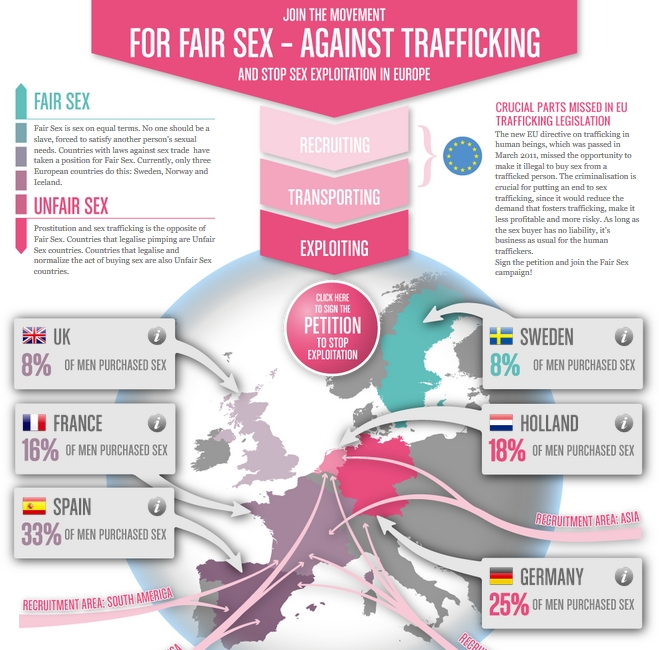The elections to the European Parliament are now very close. RealStars has therefore contacted the parties’ top candidates to ask how they and their parties will take a position on issues related to prostitution and human trafficking, and work to drive the Swedish government’s abolitionist attitude towards prostitution and sex purchases in the European Parliament.
We know that the Swedish model works. By focusing on the sex buyer, demand can be stifled. The major challenge is to change the norms that prevail in Europe, and to pay attention to the foundation of this multibillion-industry of human trafficking. There is support for this work in the EU Directive on human trafficking 2011/36/EU, which states that all Member States should work to combat the demand. In addition, in the so-called Honeyball Resolution on ‘Sexual exploitation and prostitution and its effects on equality’ from 2014, Parliament expresses that “Prostitution is therefore both a cause and a consequence of the lack of equality, and increases this deficiency” and that “reduced demand should form part of an integrated strategy on human trafficking in the Member States”.
In addition to counteracting the demand for sex purchases, well-functioning exit programs for people in prostitution are required to get out of the situation and take advantage of their human rights. Therefore, we wondered how the top candidates for the European Parliament will address these issues during their candidacy. Here we present a summary of the responses we received from five of the nine respondents.
Helene Fritzon, Social Democrats (S): “We think the Swedish Sex Purchase Act is good and we want the Swedish law to be introduced in other EU countries.” Fritzon adds that it is up to the newly elected S Group what this work will look like going forward.
Malin Björk, Left Party (V): “In the fight against human trafficking and prostitution, the Left Party stands for the Swedish Sex Purchase Act both at home in Sweden and in the EU. We see human trafficking and prostitution as two sides of the same coin.” Björk mentions that an important issue for her in the political struggle around the Sex Purchase Act is the struggle to break an evergrowing sexism. Björk concludes that “I will give this issue a high priority over the coming term and do everything I can to export the Swedish Sex Purchase Act. It is gratifying that more and more countries have introduced our model and see the benefits of legislation that penalizes sex purchases and not the vulnerable women in prostitution.”
Soraya Post, Feminist Initiative (Fi): “We in the Feminist Initiative see the European Parliament as an important platform for influence and cooperation, and we see a great need for feminism in the EU. We want the EU to give priority to its work to stop physical and sexual violence.” Post adds that during the next term of office, Fi wants, among other things, to pursue the issue of consent laws according to the Swedish model throughout the EU and the ban on the purchase of sexual services.
Tobias Tobé, Moderate Party (M): “We protect the Swedish Sex Purchase Act, which is an important instrument for preventing and combating prostitution and human trafficking for sexual purposes, and thinks it is good if more countries follow our example.” However, Tobé does not state that he or the party plans to work actively to disseminate the Sex Purchase Act within the EU. Tobé adds that the Moderate Party’s focus is on combating all types of cross-border crime: “Within the EU, we prioritize making Europe safer. Among other things, with both tools and resources, we want to sharpen the work against cross-border crime, such as trafficking and other crime that follow in the footsteps of prostitution.”
Peter Lundgren, Swedish Democrats (SD): “Counteracting prostitution, sex purchases and trafficking is of the utmost importance to society.” However, Lundgren does not mention that they want to spread the Swedish Sex Purchase Act, or how they otherwise want to counteract the causes of human trafficking and prostitution. He writes that “Measures that can and should be taken include both stricter penalties for those who actually engage in human trafficking but also through the upgrading of Customs and the border controls that can take place” but that “Individual countries should continue to be able to determine their own criminal laws even if one can advocate why restrictive ones are valuable in this case.”
Remember to vote no later than Sunday, May 26, to contribute to a Europe without trafficking! Also sign our petitition to the EU to call for laws that hold sex buyers responsible for contributing to sexual exploitation.




